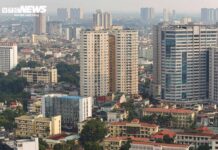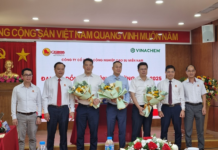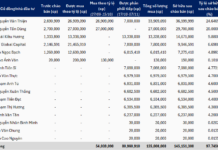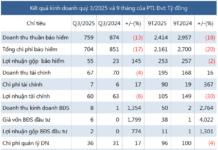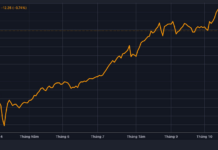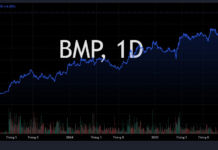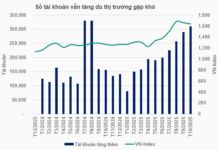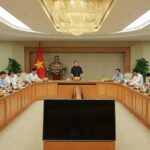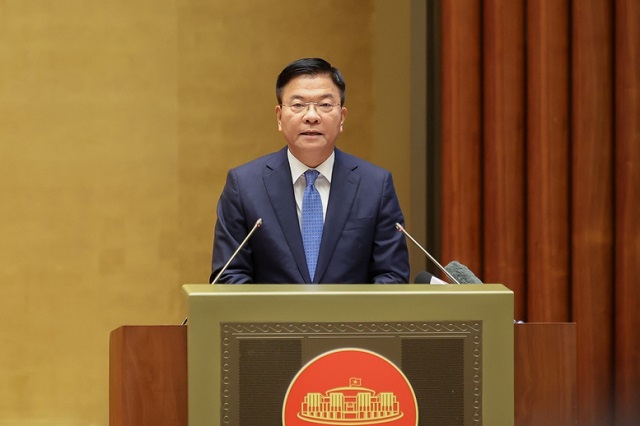
Deputy Prime Minister Le Thanh Long: With the special attention of the Party and the State, over the past years, the work of protecting, caring for, and improving the people’s health has achieved many important milestones – Image: VGP/Nhat Bac
|
Deputy Prime Minister Le Thanh Long focused on presenting four main groups of content: The current situation and the necessity of issuing the Resolution; The key contents of Resolution No. 72-NQ/TW; The main contents of the Government’s Action Plan to implement the Resolution; The organization of the implementation of the Resolution.
Many health indicators of the population surpass those of many countries
Regarding the current situation, Deputy Prime Minister Le Thanh Long stated that from the 12th National Congress to the present, the Central Committee has issued two specialized Resolutions on healthcare and population; the Politburo and the Secretariat have issued three Conclusions and four Directives. Recently, the Politburo has issued several breakthrough Resolutions, including many mechanisms and policies related to healthcare.
The guidelines, goals, tasks, and solutions all aim to enhance physical and mental health, stature, lifespan, and quality of life for the people; build an equitable, high-quality, and efficient healthcare system that integrates internationally; and move towards universal healthcare coverage and ensure access to services for all citizens.
With the special attention of the Party and the State, over the past years, the work of protecting, caring for, and improving the people’s health has achieved many important milestones.
Basic healthcare indicators have improved over the years, with some surpassing expectations and receiving international acclaim: Life expectancy has reached 74.7 years; healthy life expectancy is 65.4 years…
Healthcare institutions, mechanisms, and policies are increasingly refined: Nine Laws and four Ordinances have been enacted on preventive healthcare, medical examination and treatment, population, health insurance, and pharmaceuticals…
The healthcare system is becoming more complete and expansive: 99.6% of communes, wards, and towns have health stations; the number of hospitals has increased from 1,162 (2011) to 1,665 (2024); the number of hospital beds has risen from 24 per 10,000 people (2015) to 34 per 10,000 people (2024); …
Healthcare service quality has improved: The expanded immunization rate has reached nearly 95%; many dangerous diseases have been controlled and eliminated, especially during the COVID-19 pandemic; many advanced medical techniques have been successfully implemented.
The healthcare workforce has grown both in quantity and quality: The number of doctors has increased from 8 per 10,000 people (2015) to 14 per 10,000 people (2024)
Health insurance coverage has increased rapidly: In 2024, it reached 94.2% of the population; the capacity to supply medicines and vaccines has improved: The number of pharmaceutical production facilities has increased from 158 (2015) to 240 (2024); 10 out of 12 types of vaccines for the expanded immunization program are produced domestically.
However, according to the Deputy Prime Minister, the work of protecting, caring for, and improving the people’s health still faces limitations, shortcomings, and challenges.
Environmental protection, health promotion, food safety, and nutrition have not received adequate attention.
Preventive healthcare does not meet the requirements for disease prevention; the capacity to produce and supply medicines, medical supplies, and equipment is limited; human resource mobilization is passive, especially during major outbreaks.
Primary healthcare facilities do not provide comprehensive basic healthcare services; early disease detection through screening has not been widely implemented.
The quality of medical examination and treatment and access to healthcare services vary significantly across different levels of expertise, regions, and localities.
The healthcare workforce in some localities and primary healthcare facilities does not meet requirements in terms of quantity, structure, qualifications, and quality; there is a lack of appropriate special incentives.
The potential of traditional medicine has not been fully utilized; the application of technology and digital transformation is slow; policies and mechanisms are not strong enough to mobilize resources for healthcare development.
Deputy Prime Minister Le Thanh Long stated that, based on the assessment of achievements, analysis of causes, and forecasting of objective and subjective factors affecting healthcare in the coming period, along with the urgent requirements from practical situations, the Politburo has issued Resolution No. 72 on several breakthrough solutions to strengthen the protection, care, and improvement of the people’s health. This aims to bring about significant changes in awareness and action, as well as comprehensive innovation with breakthrough solutions to achieve the goal of building a healthy Vietnam. In this vision, every citizen enjoys healthcare, lives longer, healthier, and more actively, enhancing physical health and the awareness of health protection and disease prevention across society. This contributes significantly to promoting a wealthy, civilized, and prosperous nation in the new era.
Resolution 72 does not replace but builds upon and develops the viewpoints and goals of previous Party Resolutions in the healthcare sector; it also focuses on breakthrough tasks and solutions with many specific targets.
“This is a Resolution of strategic, comprehensive, and long-term significance with a high level of action, demonstrating the special attention and strong leadership of the Party and State in protecting, caring for, and improving the people’s health in the new development era,” said the Deputy Prime Minister.
From 2026, people will have regular health check-ups; by 2030, basic healthcare will be free of charge
Presenting some key contents of Resolution 72-NQ/TW, the Deputy Prime Minister stated that Resolution No. 72-NQ/TW outlines five guiding principles.
Protecting, caring for, and improving the people’s health is a top political goal and priority in all development strategies and policies; it is the responsibility of the entire political system, society, and every individual.
People are the central focus and receive the highest priority in policies to enhance physical and mental health, stature, lifespan, and healthy life expectancy for comprehensive development; they have equal access to quality healthcare services.
Attention is given to training and developing a high-quality, balanced healthcare workforce with strong ethics and capabilities; special incentives and benefits are provided for healthcare professionals.
There is a strong shift from focusing on treatment to proactive disease prevention. The roles of preventive healthcare, primary healthcare, and traditional medicine are clearly defined; early and remote prevention is ensured from the grassroots level. The overall quality of healthcare services is improved, specialized healthcare is developed, and health security is ensured.
Breakthrough policies and mechanisms are implemented to effectively mobilize and utilize all resources to enhance the quality of health protection, care, and improvement; science, technology, and digital transformation in healthcare are promoted; healthcare financing is reformed to ensure the effectiveness and sustainability of health insurance policies.
The Deputy Prime Minister emphasized that Resolution 72 comprehensively addresses various factors for health protection and care, including: Physical health; mental health; lifespan; quality of life; equitable access to basic services (prioritizing the poor and vulnerable); disease prevention and preventive healthcare; digital transformation; innovative management and resource mobilization with the responsibility of relevant agencies.
The Resolution sets clear goals for 2030, including increasing the average height of children and adolescents aged 1-18 by at least 1.5 cm; raising life expectancy to 75.5 years, with healthy life expectancy reaching at least 68 years.
The immunization rate for vaccines in the Expanded Program on Immunization will exceed 95%. The proportion of people regularly engaging in physical activities will increase by 10%. Stronger control will be exerted over health risk factors such as alcohol, tobacco, and environmental pollutants like soil, water, and air…
People will have access to quality healthcare services, moving towards comprehensive health coverage. From 2026, people will receive free annual health check-ups or screenings, and electronic health records will be established to manage health throughout their lifecycle, gradually reducing healthcare costs. By 2030, basic healthcare services will be free within the scope of health insurance benefits, following a phased approach.
100% of commune-level health stations will be equipped with infrastructure, medical equipment, and personnel according to their functions and tasks.
By 2026, health insurance coverage will reach over 95% of the population, and by 2030, it will achieve universal coverage; various forms of health insurance will be developed.
Regarding the vision for 2045, the Deputy Prime Minister stated that the goal is to achieve a high-quality living environment; health indicators and essential healthcare service coverage will match those of developed countries in the region and worldwide. Life expectancy will exceed 80 years, with healthy life expectancy increasing to over 71 years. The average height and physical strength of young people will be comparable to those in countries with similar development levels. The healthcare system will be modern, equitable, efficient, and sustainable, prioritizing disease prevention and meeting the diverse and increasingly high healthcare demands of the people.
Designating April 7th as “National Health Day”
Regarding tasks and solutions, the Resolution outlines six groups of tasks and solutions.
First, fundamentally renewing thinking and actions in leadership, direction, and organization of healthcare implementation. This includes unifying awareness and actions; integrating and prioritizing healthcare indicators in development strategies, plans, and policies; and designating World Health Day (April 7th) as “National Health Day.”
Second, promptly improving institutions and enhancing the capacity of the healthcare system, especially preventive healthcare, primary healthcare, and traditional medicine. This involves (i) comprehensively improving institutions and implementing them effectively.
Third, enhancing medical ethics and developing a high-quality, synchronized healthcare workforce that meets patient satisfaction and international integration standards.
Fourth, promoting healthcare financing reform and developing effective, sustainable health insurance policies. This includes ensuring state budget allocations for essential healthcare tasks and maintaining the state budget’s leading role. Prioritizing annual state budget increases for healthcare. Implementing free annual health check-ups. Providing free basic healthcare services within the scope of health insurance.
From 2026, gradually increasing the proportion and payment levels for disease prevention, early diagnosis, and treatment for certain diseases and priority groups. The state budget and health insurance fund will cover some preventive services, chronic disease management, regular health check-ups, and screenings as required by professionals.
Fifth, making breakthroughs in science, technology, innovation, and comprehensive digital transformation in healthcare.
Sixth, promoting the development of private healthcare and effectively mobilizing all resources for healthcare development.
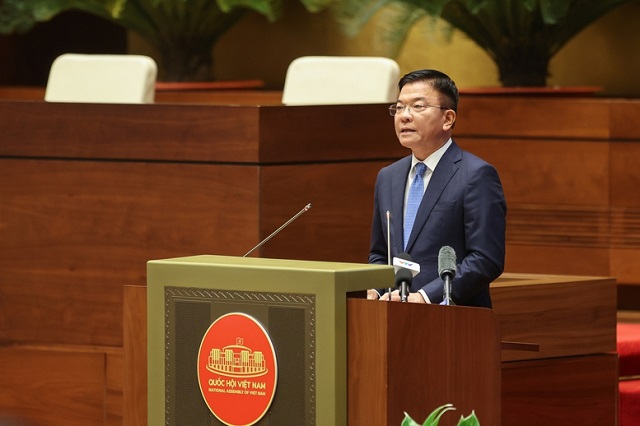
Deputy Prime Minister Le Thanh Long emphasized that this is a Resolution of strategic, comprehensive, and long-term significance with a high level of action – Image: VGP/Nhat Bac
|
The Government can balance the budget to provide free healthcare for all
Presenting the main contents of the Government’s Action Plan to implement Resolution 72-NQ/TW, the Deputy Prime Minister emphasized the “6 Clears” principle: clear responsibilities, clear authorities, clear timelines, and clear results. The Action Plan has identified specific tasks for ministries, sectors, and localities to develop action plans, organize implementation, inspection, supervision, and evaluation of the Resolution’s execution; it outlines six main groups of tasks and solutions (51 specific actions).
Accordingly, all levels, sectors, and localities need to immediately issue implementation plans for Resolution No. 72 and the Government’s Action Plan in November 2025.
Regarding implementation, Deputy Prime Minister Le Thanh Long stated that the list of tasks assigned to agencies within the political system is longer compared to previous resolutions.
Resolution 72 contains many specific contents, including a socially significant concern: “How can the state ensure sufficient resources for implementation?”
At the conference, Deputy Prime Minister Le Thanh Long provided estimated costs for some specific policies to implement Resolution 72 in 2026.
The first group concerns special allowances for healthcare workers, with different levels (100% and 70% of the salary) for different groups (healthcare workers in certain public primary and preventive healthcare facilities in difficult regions and priority areas). The estimated cost is 4,335 billion VND/year, higher than the current salary policy for healthcare workers. According to the Deputy Prime Minister, this amount can be balanced.
The second group involves the cost of free annual health check-ups or screenings for the population. With a population of 100 million and a cost of 300,000 VND per check-up, the total cost is 30 trillion VND. Employers will cover the cost for 16 million workers, amounting to 4,800 billion VND. Therefore, the state budget needs to cover 25 trillion VND.
The third group concerns the policy of free healthcare services. The Deputy Prime Minister noted that countries are very cautious when calculating free healthcare costs, using various methods such as taxation or health insurance contributions.
Based on estimates, the Ministry of Health used 2024 data, with the health insurance fund paying about 140 trillion VND and patients paying about 21,545 billion VND. Thus, from 2026, the state will need to cover a maximum of 21,545 billion VND/year. The current health insurance surplus is about 49-50 trillion VND, which can cover the first two years. Afterward, a roadmap to increase health insurance contributions will be needed to balance the budget. “The Ministry of Health and the Government have calculated this relatively carefully and find it feasible, with the budget balance achievable in the coming period,” said the Deputy Prime Minister.
– 13:45 16/09/2025
Streamlining Construction Permits: The ‘One-Stop, One-Lock’ Approach to Approval and Licensing
Revolutionizing the construction permit process, Deputy Director of Hanoi’s Department of Construction, Luyen Van Phuong, has proposed a transformative reform in the revised Construction Law draft. His advocacy for a streamlined “one-stop, one-lock” mechanism aims to simultaneously evaluate and significantly reduce processing times, garnering widespread attention as a pivotal step toward administrative efficiency.
NCB Bank’s Two Distinctive Milestones in September
In September, amidst the proud atmosphere of the 2/9 National Day and the 30th anniversary of its establishment, NCB ignited the emotions of millions of Vietnamese with two remarkable milestones: partnering with the million-view MV “Vietnam – Proudly Stepping into the Future” and launching the special edition NCB Visa “Pride” credit card.
Top Korean Retail Giant Discovers Vietnam’s ‘Goldmine,’ Plans to Open 2-3 Mega Malls Amid Sluggish Domestic Sales
Lotte’s strategy targets the premium consumer segment by leveraging Korean-style marketing, capitalizing on the growing allure of Korean culture and cuisine to tap into the market’s robust purchasing power.
Sustainable Development: The New Competitive Edge for Vietnamese Businesses
At the “Green for Growth: How Sustainability Unlocks New Opportunities” seminar, co-hosted by EuroCham Vietnam, UOB Vietnam, and partners in August 2025, Mr. Jason Yang, Director of Sustainable Development at UOB Vietnam, shared strategic insights on the role of sustainability in Vietnam’s next phase of economic growth.








